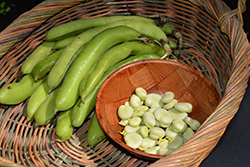Fri & Sat 8am - 8pm
Sun 8am - 7pm
Anytown, USA 12345
fax: 261.787.0463
e-mail: info@successgc.com


Plant Finder

Height: 4 feet
Spacing: 12 inches
Sunlight:
![]()
Hardiness Zone: (annual)
Other Names: Fava Bean, Broad Bean
Description:
A great variety for fresh eating or drying; tall upright habit produces long 6-7 inch long broad pods that mature to dark brown; cream colored beans are great cooked, boiled, fried or even dried
Edible Qualities
Jumbo Fava Bean is an annual vegetable plant that is typically grown for its edible qualities. It produces green long pods with creamy white flesh which are harvested from mid spring to mid fall. The pods will often fade to dark brown over time. The pods have a mild taste and a firm texture.
The pods are most often used in the following ways:
- Fresh Eating
- Eating When Cooked/Prepared
- Cooking
- Drying
Planting & Growing
Jumbo Fava Bean will grow to be about 4 feet tall at maturity, with a spread of 12 inches. When planted in rows, individual plants should be spaced approximately 12 inches apart. Because of its vigorous growth habit, it may require staking or supplemental support. This fast-growing vegetable plant is an annual, which means that it will grow for one season in your garden and then die after producing a crop. Because of its relatively short time to maturity, it lends itself to a series of successive plantings each staggered by a week or two; this will prolong the effective harvest period.
This plant is typically grown in a designated vegetable garden. It should only be grown in full sunlight. It does best in average to evenly moist conditions, but will not tolerate standing water. It is not particular as to soil pH, but grows best in rich soils, and is able to handle environmental salt. It is quite intolerant of urban pollution, therefore inner city or urban streetside plantings are best avoided. This is a selected variety of a species not originally from North America.; however, as a cultivated variety, be aware that it may be subject to certain restrictions or prohibitions on propagation.
